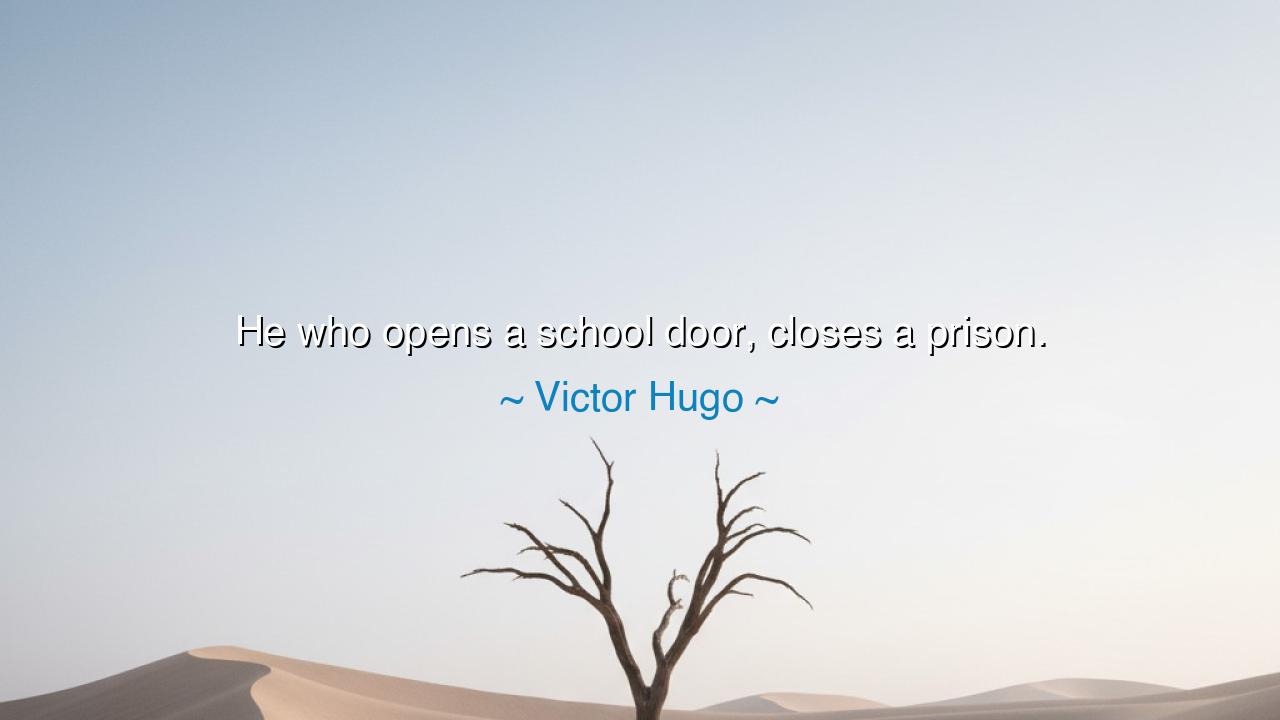
He who opens a school door, closes a prison.






“He who opens a school door, closes a prison.” Thus wrote Victor Hugo, the great French poet and prophet of the human soul, whose words carried the weight of both compassion and thunder. In this simple and immortal saying, he unveils a truth as old as civilization itself: that education is the guardian of freedom, and ignorance the mother of bondage. Every school door opened is a gate to light; every prison built is a monument to the failure of enlightenment. To teach is to heal the root of injustice; to learn is to escape the chains of darkness.
Hugo spoke these words in the 19th century, a time when Europe was torn between progress and poverty, between the rising dawn of knowledge and the lingering shadow of despair. He saw the suffering of the poor, the orphan, the criminal — not as sins of the soul, but as the wounds of a society that had failed to educate its children. In his masterpiece Les Misérables, he embodied this truth in the story of Jean Valjean, a man imprisoned for stealing bread, a victim of hunger, ignorance, and the cold machinery of law without mercy. Hugo knew that if Valjean had been nourished not just with bread but with knowledge — with opportunity — he would never have needed to steal. Thus, the school becomes the fortress of hope; the prison, the echo of its absence.
When a child learns to read, to question, to imagine — that child becomes unchained. He or she is no longer a captive of circumstance or the tyranny of others’ words. The educated mind cannot easily be deceived, nor can it be subdued. Education gives wings to the soul, armor to the conscience, and strength to the spirit. This is why Hugo equates a school with a sacred temple — because in every lesson lies a seed of freedom, and in every free mind, a defense against despair and crime. The one who opens a school does not merely teach — he redeems.
The ancients understood this wisdom as well. Plato, in his Republic, declared that ignorance is the root of evil and that the just society must educate all its citizens, lest corruption breed in the shadows. Likewise, Confucius taught that learning is the path to virtue — that the ignorant ruler will oppress, and the unlearned people will stumble. Through all ages, the enlightened have known that knowledge is not a luxury, but the very breath of civilization. For where ignorance reigns, vice multiplies; and where wisdom shines, even the hardened heart may soften.
One need only look to the story of Booker T. Washington, born into slavery in the United States, to see Hugo’s words made flesh. As a boy, he had no shoes, no wealth, no name that carried power. Yet he hungered not only for food but for learning. Walking miles each day to reach the schoolhouse, he studied by candlelight, lifting himself from bondage into greatness. In founding the Tuskegee Institute, he opened not just one door but thousands, closing the invisible prisons that ignorance had built for his people. Through education, he proved that liberation is not granted by law alone, but by the awakening of the mind.
Victor Hugo’s vision, therefore, is both moral and revolutionary. He does not mean that every school literally replaces a prison, but that the more a society invests in education, the less it must invest in punishment. Crime is not born in the heart, but in the void — the void of opportunity, of guidance, of vision. To open a school is to strike at the root of misery; to close one is to sow the seeds of despair. Every teacher is a builder of peace; every neglected child, a potential prisoner of fate. Thus, the health of a nation can be measured not by the height of its walls, but by the number of its open school doors.
So, my listener, take this truth into your heart: if you would change the world, begin not with judgment but with education. Support the schools, honor the teachers, uplift the children. For every mind you enlighten, you extinguish a spark of hatred; for every hand you teach, you disarm a weapon of violence. Let your legacy be not of punishment, but of prevention — not of prisons, but of possibilities.
And remember always the wisdom of Victor Hugo: to teach is to redeem, to enlighten is to free. For in the end, it is not the bars of steel that imprison mankind, but the darkness of ignorance — and the brightest torch that breaks those bars is the lamp of education.






AAdministratorAdministrator
Welcome, honored guests. Please leave a comment, we will respond soon